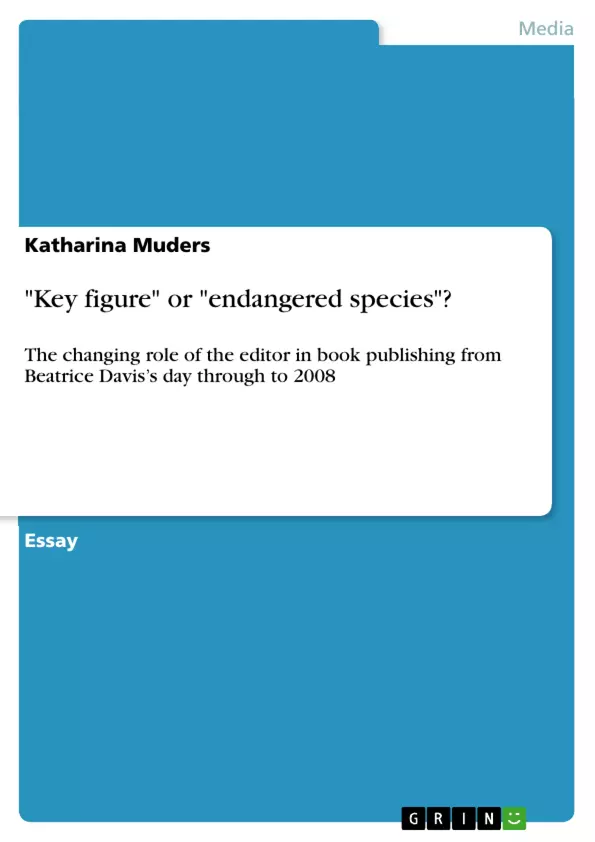In this essay I am going to provide an overview of the changing role of the editor in book publishing from Beatrice Davis’s day through to 2008, a phase marked by incisive and far-reaching alterations. At first I will expose the role of the editor and his challenges in the age of Beatrice Davis, who was a pioneer in her business as one of the first literary editors in Australia. Then I will point out important changes, the publishing industry went through, and in which amount these also had an impact on the role of the editor. Not only market changes and commercial pressures, but first and foremost the digital revolution plays a determining role in this development. Finally, I will outline the role of the editor today and glance at the future prospects of the editing business, according to Morrison (2005) who is concerned with the question: “Has editing had its day?”
Inhaltsverzeichnis (Table of Contents)
- The Changing Role of the Editor in Book Publishing
- The Role of the Editor in the Age of Beatrice Davis
- The Impact of the Digital Revolution
- The Role of the Editor Today and Future Prospects
- The Editor's Role: A Historical Perspective
- Early Stages of Change
- The Digital Revolution and its Impact on Editing
- The Changing Relationship Between Editor and Author
- Commercial Pressures and Market Changes
Zielsetzung und Themenschwerpunkte (Objectives and Key Themes)
This essay examines the evolution of the editor's role in book publishing from the early 20th century to 2008. It explores how the profession has been shaped by technological advancements, particularly the digital revolution, as well as by changing market dynamics and commercial pressures. The essay specifically looks at how the editor's work has shifted from a focus on cultural value to a more market-oriented approach.- The historical development of the editor's role in book publishing
- The impact of the digital revolution on editing practices and the publishing industry
- The changing relationship between editors and authors
- The increasing influence of market forces and commercial pressures on editorial decisions
- The future prospects of the editing profession
Zusammenfassung der Kapitel (Chapter Summaries)
The essay begins by outlining the traditional role of the editor in the book publishing industry, focusing on the work of Beatrice Davis, a pioneer in Australian literary editing. It then examines the impact of the digital revolution on editing practices, highlighting the adoption of new technologies and the rise of freelance editing. The essay further explores how commercial pressures and market changes have influenced the editor's role, leading to a greater emphasis on marketability and profitability.Schlüsselwörter (Keywords)
The essay focuses on the key terms and concepts related to the evolution of the editor's role in book publishing, including the impact of technology, the changing dynamics between editors and authors, the influence of market forces, and the evolving nature of the publishing industry. Key themes include: digital revolution, commercialization of culture, market forces, and the relationship between editors and authors.Frequently Asked Questions
How has the role of the book editor evolved over time?
The editor's role has shifted from a traditional focus on cultural and literary value to a more market-oriented approach driven by commercial pressures and technological changes.
Who was Beatrice Davis and why is she significant?
Beatrice Davis was a pioneer in Australian literary editing, representing the classic era of editors who focused deeply on the relationship with the author and the quality of the text.
What impact did the digital revolution have on the publishing industry?
The digital revolution introduced new technologies that changed editing practices, increased the use of freelance editors, and accelerated the overall publishing process.
How has the relationship between authors and editors changed?
While once a close, long-term partnership, the relationship is now often more transactional and influenced by the commercial goals of publishing houses.
What are the main challenges for editors in the 21st century?
Editors face increasing pressure to ensure profitability, manage faster production cycles, and adapt to the commercialization of culture while maintaining editorial standards.
Is the editor an "endangered species" in modern publishing?
The essay discusses whether the traditional, deep-level editor is disappearing in favor of market-driven roles, questioning the future of the profession.
- Quote paper
- Katharina Muders (Author), 2009, "Key figure" or "endangered species"?, Munich, GRIN Verlag, https://www.grin.com/document/130428



